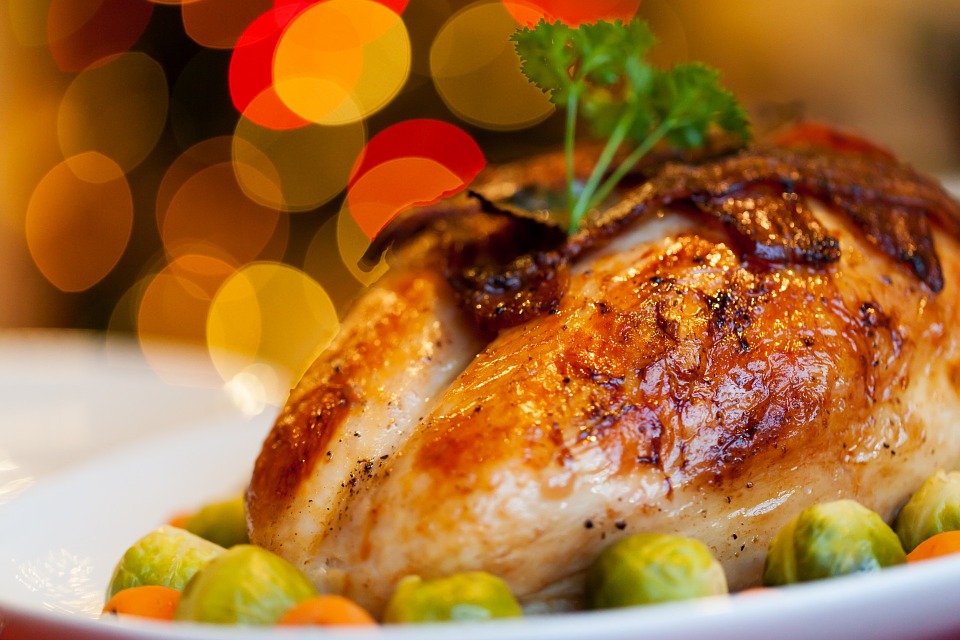The Sunday roast is an institution for many families across the globe. From Australia to the UK, families come together on a Sunday to share a meal. More often than not, this meal is centred around a joint of roast meat – traditionally lamb or beef.
The health implications and environmental impacts of our diet have now become a regular discussion topic, with sustainable dietary advice recommending that we reduce meat consumption and increase our consumption of plant-based proteins, fruits and vegetables. But what does this practically mean: how can we eat for health and sustainability on a day-to-day basis?
Sources advocate shifting to a fully plant-based, vegetarian diet. Many people are resistant to this level of dietary change, however. But, as the old saying goes, every little helps. Many are opting for “meat-free Mondays” or even meat-free lunches. Messing with the Sunday roast, however, is a step too far for most. But given its focus on huge hunks of meat and energy inefficient cooking methods, it’s important to consider. So how might we create a more sustainable Sunday roast?
The main event
The Sunday roast - like most meals using animal products - has a high environmental impact. The joint of meat itself can account for up to 60%-70% of the environmental impacts of the entire meal. This is due to the large amounts of water, land, and feed required to produce meat.
Purchasing sustainable and ethically farmed meat with lower environmental impacts can result in small (~5%) environmental savings. However, to really reduce the environmental impact of meat, we need to eat less of it. So reducing the amount of meat is therefore the first step towards creating a sustainable Sunday roast.

The portion sizes for roast meats depend on the recipe used and can vary widely. Many roast beef recipes suggest between 125g-800g per person. In the UK, dietary guidance suggests eating below 70g of red and processed meat per day, these are very large portions indeed.
Such large portions of beef can be partly explained by the need for leftovers in traditional recipes. But in today’s busy world, leftovers can easily become food waste. In 2014, a shocking 8% of beef purchased by UK households became food waste. Over half of this was totally avoidable, caused by the cooking, serving or preparing of too much food, or leftovers not being used in time. With this in mind, our sustainable Sunday roast requires small portions – say 125g per person, meaning 50-70g for lunch, and a manageable amount for leftovers the next day.
Turning down the heat
A further benefit of cutting meat portions for a sustainable roast is that it will have a shorter cooking time, meaning less energy to cook, and reduced associated environmental impacts. Cooking is the other main contributor to this. The oven is an inefficient way of cooking meat at hot temperatures, and for long periods of time. The environmental impact of roasting a joint of meat for over an hour in an oven contributes 20-30% of the environmental impacts of the entire meal.
To make matters worse, overcooking roasts – for an extra 41 minutes, for example – adds further impacts through pointless energy use.
So as well as reducing the amount of meat served, we might also use new methods to cook a sustainable Sunday roast. Reverse searing involves cooking the joint of beef in low heat oven or a slow cooker – until the internal temperature of the joint is between 55-60°C (the temperature that medium done beef is cooked to) – and then transferring it to pan and searing the joint. Depending on the energy efficiency of your oven or slow cooker, reverse searing may well have a lower impact than traditional cooking.
Cooking sous vide, meanwhile, involves placing a joint of beef in a vacuumed plastic pouch or bag, and submerging this in a heated water bath for several hours until the internal temperature of the joint is between 55-60°C. The joint is then unwrapped and placed in a hot skillet to sear its surface. Although this may sound like a lot of work, the method gives the cook total control of the texture and flavour and can use less than half the energy of a traditional oven method.
By combining sustainable sourced meat, a reduced portion size, and modern cooking methods, we could reduce the environmental impacts of a Sunday roast by over half.
Unfortunately, reducing the environmental impact of our Sunday roast will not hugely reduce the overall environmental impact of our diet. For this we need to further reduce our meat consumption and increase our consumption of plant based proteins, fruits and vegetables across all meals. In comparison to other more plant-forward meals that could be eaten, a sustainable Sunday roast has high environmental impacts. For this reason, even the sustainable Sunday roast should be kept as a special meal, and not eaten every week.
The good news is that, if even an environmentally damaging meal such as the Sunday roast can be made a little more sustainable, it should be possible to create appetising yet sustainable versions of other popular dishes too.
This article was originally published on The Conversation. Read the original article.
![]()
Are humans | ruining the Earth?
Vote now-
Read More
- Fair weather badgers - the challenges of sampling in a climate change ecology
- Ancient teeth show how our ancestors coped with climate change
- How to cook a more sustainable Sunday Roast dinner
- What can we all do to fight climate change in today's political climate?
- Are humans ruining the Earth? Take this further...
- Dig deeper with a student...
-
Watch More
-
Do More